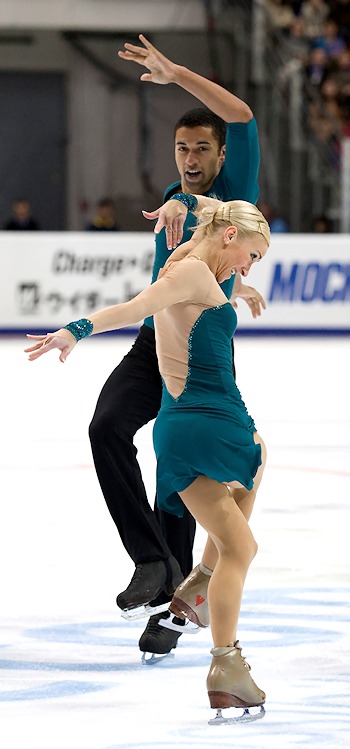The Pairs free skating event was the highlight of the second competition day at the Moscow “Megasport” palace. The top two teams – Germany’s Aljona Savchenko and Robin Szolkowy and Russia’s Yuko Kavaguti and Alexander Smirnov – produced performances worthy of a World Championships final.
Italians Stefania Berton and Ondrej Hotarek took the bronze and made history by becoming the first Italian pair skating team to win a medal at a Grand Prix Series event.
Savchenko and Szolkowy’s performance to the soundtrack from Pina was one of the finest in their career. The skaters, who often struggle with consistency in their sophisticated routines, made only one small mistake over the course of four minutes: Savchenko stepped out of a double Axel landing. The rest of the elements were so solid that the protocol shows only one individual “0” as a Grade of Execution (GoE), while all other marks were higher with “+2” being the predominant one.
The most stunning aspect of the performance, however, was not the technical proficiency, but rather how well parts of the program came together to create a whole out of pieces different in style.
“We are very happy with the way we skated today despite the small mistake we made,” said Savchenko afterwards. “It was great.”
The students of Ingo Steuer skated right after a strong performance by their Russian rivals, but the skaters deny that it had any impact on them.
“We had not heard their marks,” explained Savchenko. “We were completely focused on our own performance.”
They posted the highest scores of the season among all teams, both in the free program (139.97) and overall (208.69).
Kavaguti and Smirnov also skated a nearly flawless routine to Claire de Lune by Claude Debussy. The only mistake came when Kavaguti stepped out of a throw triple loop landing. The similarities in delivery prompted Smirnov to repeat Savchenko’s answer at the press conference verbatim.
“We are very happy with the way we skated today, despite the small mistake we made,” said the skater with a smile.
“We are happy that we were able to skate here in Moscow again and make our coach and the audience happy,” he added.
The students of Tamara Moskvina, however, opted for an easier jump combination (two double Axels vs. two triple toe loops for Germans) and only earned level three for their death spiral and one of the lifts.
“The decision to go for a sequence of two double Axels was a strategic one on our part,” explained Smirnov. “It was made together with our coach.”
The team hopes to increase the base value of their program in the future, however.
“Our main task at the moment is to restore a quad throw,” said Smirnov. “We have to do it before the Olympic Games because we will need it in Sochi.”
“Other teams are catching up. They are doing the throw triple Axel,” he added, referring to Savchenko and Szolkowy’s attempts on the element. “We have to press our advantage.”
While the team finished in a distant second (197.84), the 10-point spread does not do justice to the quality of their performance. They have kept last season’s routine, and the mileage allows them not only to work out all the rough spots, but also to learn the pace and nuances of the music very well. This resulted in a very touching execution of the entire piece.
Berton and Hotarek captured the bronze medal despite making two mistakes in their program set to Tomaso Albinoni’s Adagio. Berton singled a planned triple Salchow, and later the team executed only a double throw instead of the triple. It was, however, enough to retain their position since none of the other teams were able to avoid serious mistakes.
“It is a great honor to be here and to have won our first Grand Prix medal here in Moscow,” said Hotarek. “It will stay in our memory for a long time. We wanted to skate better, but we had pressure.”
Russia’s Ksenia Stolbova and Fedor Klimov finished fifth in the long program, but remained fourth overall (149.66) after a shaky performance to Polovetsian Dances.
Stolbova and Klimovran into trouble right from the beginning. During the first seconds of the program, they executed a dance lift and Stolbova slipped from her partner’s arm and fell on the ice. The unexpected mistake seemed to throw her off and she appeared to be disoriented before getting back into the game. The students of Liudmila Velikova recovered well by nailing their jumps, but Stolbova fell on a throw triple flip and then slipped out of her partner’s grasp again on the dismount of their final lift.
Click here for full ISU Figure Skating and Ice Dancing Results and Protocols (opens in new window).

